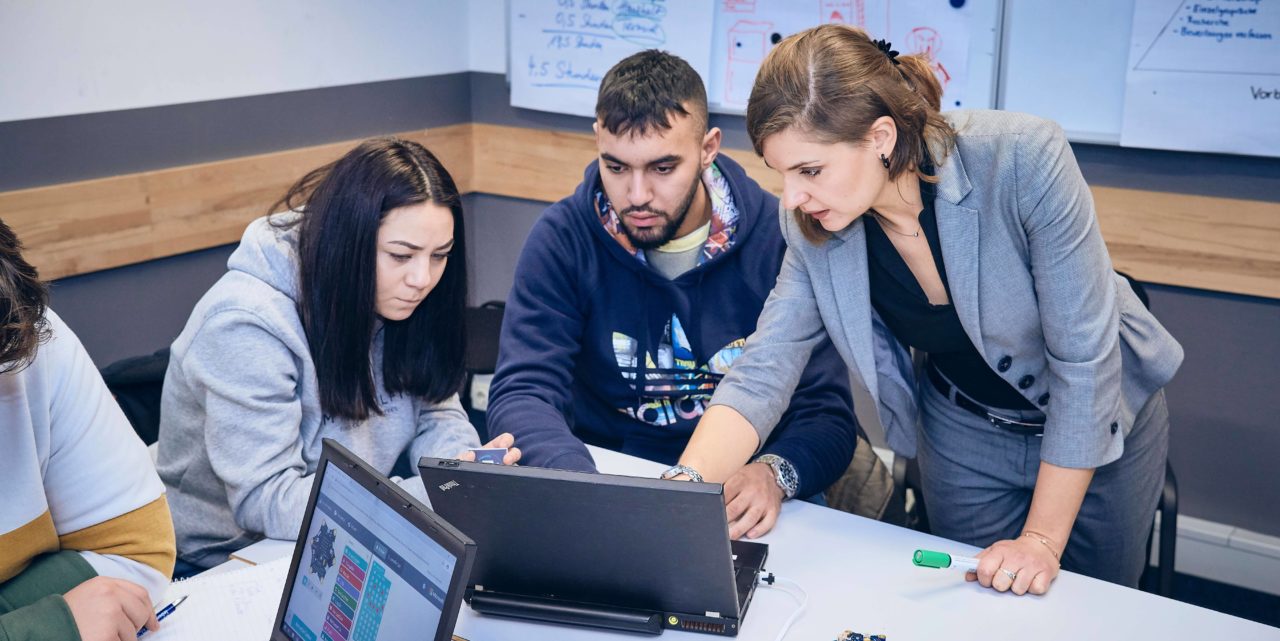 Integration through vocational training
Integration through vocational training
Support for refugees and their vocational training companies
Amal (19) is one step closer to her dream of working in a dental practice. During her vocational training, she will face many challenges and will have to be very strong. And yet, this time lays the foundation for a self-determined life. Amal is driven by two desires above all: having her own flat and financial independence. So far, she has not received the support she needs at home, where the work for the family often falls to her. However, Amal is determined to stand up for herself and her goals. To do so, she needs appreciation, support and the courage not to give up - even if there are problems. For her, the path through vocational training means not only professional qualifications, but also the opportunity to develop personally. She gains self-confidence, experiences self-efficacy, overcomes insecurities and grows beyond herself.
Necessity
Challenges in vocational training for refugees and lack of needs-based support services.
Activity
Needs-based vocational training support for refugees and their companies through German courses, workshops and individual counselling.
Countable effort
Number of minutes of support provided as part of vocational training.
Result
The vocational training has been successfully completed and the participants have moved on to permanent employment.
Systemic effect
Refugees have been successfully integrated into society and the willingness of companies to provide vocational training for refugees has been increased.
Background
Wars and crises in countries such as Syria, Iraq and Afghanistan have led to more and more people coming to Germany in the last ten years to seek sanctuary and build a new future for themselves. The majority of the now 1.7 million refugees are of working age, and 60 per cent of them are actually under 30 years old (BIBB, 2019). Placing young refugees in vocational training and work is therefore a central function of German integration work.
In the meantime, every tenth company employs refugees as part of vocational training. For many of these companies, however, this also brings new challenges. For example, more than 90 per cent of companies cite a lack of German language skills as an obstacle in the training process. In addition, companies find it difficult that many refugees first have to get used to the new working environment. The majority of companies also consider the effort required for additional support to be too much (Pierenkemper & Heuer, 2020). In order not to leave companies alone with the integration of refugees into the labour market, there are numerous public support measures. However, these are not always specifically geared to the needs of refugees, and 60 per cent of companies state that the offers do not fit their requirements (Pierenkemper & Heuer, 2020).
The good deed
Thanks to your good deed, young refugees receive 8 minutes of help in their vocational training. Successful vocational training is the key to successful integration. The core component of the training assistance is a German language course to promote professional language skills, as a lack of German skills is seen as the greatest challenge in the training process. The German course is supplemented by various workshops and tutoring services based on what refugees and companies need. At the same time, the key competences of the refugees are to be strengthened. These programmes are accompanied by an open office hour for companies and refugees, where we provide advice and support on questions and issues. Successful completion of vocational training opens the doors to a self-determined life. Your good deed today thus promotes the social and professional participation of young refugees in Germany and reduces companies' reservations about hiring refugees.

AboutGermany
Berlin
Capital
83,240,525
Number of inhabitants
45,723 USD
Gross domestic product per capita per year
6 of 189
Human Development Index
The Dual System of vocational education and training in Germany makes it much easier for young refugees to gain a foothold in Germany - and is seen as a positive role model in many other countries.
About the organization and further information
Association
JOBLINGE gAG Rheinland
Website
https://www.joblinge.de/standorte/koeln


Further information and source
- Bergseng, B., Degler, E. & Lüthi, S., 2019. Unlocking the Potential of Migrants in Germany, OECD Reviews of Vocational Education and Training, OECD Publishing, Paris.
- BIBB (Hrsg.), 2019. Datenreport zum Berufsbildungsbericht 2019. Informationen und Analysen zur Entwicklung der beruflichen Bildung, Stand: 01.04.2021, Bonn.
- Pierenkemper, S. & Heuer, C., 2020. Erfolgreiche Integration. Mehr Geflüchtete in Ausbildung und Beschäftigung, Institut der deutschen Wirtschaft Köln e.V., Köln.




